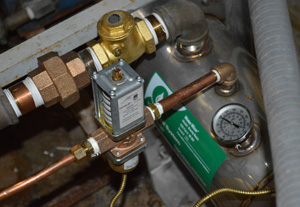Equipment retrofit reduces water use in campus labs


A new NC State water conservation project is making campus research more water-efficient one steam sterilizer at a time.
To decontaminate lab waste and clean scientific equipment, many NC State research labs use autoclaves, a steam sterilizer that can churn through more than a half a million gallons of water annually depending on the machine’s age and efficiency. Recently seven of NC State’s inefficient autoclaves were retrofitted with water-saving devices that have slashed water use.
“At each autoclave we retrofitted, we measured approximately $5,000 of water per year going down the drain. Once the new water-saving devices were installed, water use was reduced by up to 90 percent,” said NC State Energy Management program coordinator Claudia Powell.

The savings come from a device that changes how hot water is cooled upon exiting the autoclave. The steam that sterilizes equipment turns into condensate, or hot water, that’s too warm to release immediately into the sewer system. To cool the condensate below the required 140 degrees, an inefficient autoclave uses a constant supply of domestic water – at a rate of about one gallon per minute flowing all day, every day. The updated autoclaves are now equipped with a cooling reservoir system that directs condensate to a holding tank, where domestic water is mixed in as necessary before being release into the sewer drain.
“The autoclave still operates as it did before,” Powell said. “The improvement makes no difference to the users; they don’t even know the device is there.”
Two of the devices were installed at the College of Veterinary Medicine, where the initial idea launched for a pilot project.
“We had some [vet] students that contacted the Sustainability Office asking them to check on the water flow rates in some of the restrooms,” said Ken Satterwhite, the college’s site director. “I joined them on their survey and we started discussing the constant stream of water used by the older autoclaves.”
From there, water-saving technology was researched and purchased by Energy Management as a pilot project. The project’s success has led to the purchase of more devices that will be installed at campus autoclaves with the most potential for water savings.
“The cost of water continues to increase sharply, so saving water on campus is a priority,” Powell said.